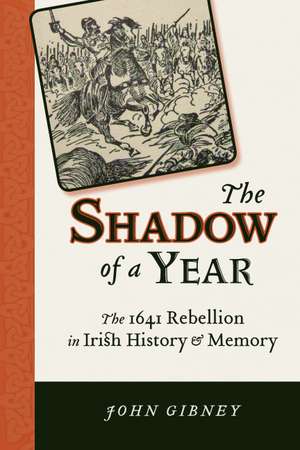The Shadow of a Year: The 1641 Rebellion in Irish History and Memory: History of Ireland & the Irish Diaspora
Autor John Gibneyen Limba Engleză Paperback – 14 feb 2013
In October 1641 a rebellion broke out in Ireland. Dispossessed Irish Catholics rose up against British Protestant settlers whom they held responsible for their plight. This uprising, the first significant sectarian rebellion in Irish history, gave rise to a decade of war that would culminate in the brutal re-conquest of Ireland by Oliver Cromwell. It also set in motion one of the most enduring and acrimonious debates in Irish history.
Was the 1641 rebellion a justified response to dispossession and repression? Or was it an unprovoked attempt at sectarian genocide? John Gibney comprehensively examines three centuries of this debate. The struggle to establish and interpret the facts of the past was also a struggle over the present: if Protestants had been slaughtered by vicious Catholics, this provided an ideal justification for maintaining Protestant privilege. If, on the other hand, Protestant propaganda had inflated a few deaths into a vast and brutal “massacre,” this justification was groundless.
Gibney shows how politicians, historians, and polemicists have represented (and misrepresented) 1641 over the centuries, making a sectarian understanding of Irish history the dominant paradigm in the consciousness of the Irish Protestant and Catholic communities alike.
Was the 1641 rebellion a justified response to dispossession and repression? Or was it an unprovoked attempt at sectarian genocide? John Gibney comprehensively examines three centuries of this debate. The struggle to establish and interpret the facts of the past was also a struggle over the present: if Protestants had been slaughtered by vicious Catholics, this provided an ideal justification for maintaining Protestant privilege. If, on the other hand, Protestant propaganda had inflated a few deaths into a vast and brutal “massacre,” this justification was groundless.
Gibney shows how politicians, historians, and polemicists have represented (and misrepresented) 1641 over the centuries, making a sectarian understanding of Irish history the dominant paradigm in the consciousness of the Irish Protestant and Catholic communities alike.
Preț: 164.94 lei
Nou
Puncte Express: 247
Preț estimativ în valută:
31.56€ • 33.07$ • 26.09£
31.56€ • 33.07$ • 26.09£
Carte disponibilă
Livrare economică 21 martie-04 aprilie
Preluare comenzi: 021 569.72.76
Specificații
ISBN-13: 9780299289546
ISBN-10: 0299289540
Pagini: 244
Ilustrații: 9 b-w photos
Dimensiuni: 152 x 229 x 25 mm
Greutate: 0.3 kg
Ediția:1
Editura: University of Wisconsin Press
Colecția University of Wisconsin Press
Seria History of Ireland & the Irish Diaspora
ISBN-10: 0299289540
Pagini: 244
Ilustrații: 9 b-w photos
Dimensiuni: 152 x 229 x 25 mm
Greutate: 0.3 kg
Ediția:1
Editura: University of Wisconsin Press
Colecția University of Wisconsin Press
Seria History of Ireland & the Irish Diaspora
Recenzii
“Gibney provides exactly the over-arching examination of the ‘history wars’ that we have been waiting for and, in the context of the Northern Ireland Peace Process and the recent mass digitization of the 1641 loyalist depositions, it is exceptionally timely.”—David Dickson, Trinity College Dublin
“This is the best account to date of how continuing English-language disputations concerning the nature of the insurrection that occurred in Ireland in 1641 influenced present politics for three centuries, in three countries and in two continents. Scholars in the U.S. will benefit especially from John Gibney's discussion of how the subject was re-opened in a new environment by Matthew Carey, who was responding in part to the inclusion of the extreme Protestant interpretation of the subject in the Amerian editions of Foxe’s Book of Martyrs”—Nicholas Canny, National University of Ireland, Galway
“Gibney’s work is deeply researched, well documented, and extremely well written. It will be a valuable resource for lay readers, scholars, and students. Highly recommended.”—Library Journal, STARRED REVIEW
Notă biografică
John Gibney earned his doctorate in history at Trinity College Dublin and is author of Ireland and the Popish Plot. A guide for the popular Historical Walking Tours of Dublin offered by Historical Insights Ireland, he is a frequent contributor to History Ireland magazine and scholarly journals. He has been a research fellow at the University of Notre Dame and the National University of Ireland, Galway.
Cuprins
List of Illustrations
Acknowledgments
Introduction
1 "The Sad Story of our Miseries": Protestant Interpretations of the Rebellion, c. 1641–c. 1840
2 "The Naked Truth of this Tragical History": Catholic Interpretations of the Rising, c. 1641–c. 1865
3 "Historical Facts" and "Stupendous Falsehoods": An Irish Insurrection at the Limits of Scholarship, c. 1865–c. 1965
Conclusion
Notes
Bibliography
Index
Descriere
In October 1641 a rebellion broke out in Ireland. Dispossessed Irish Catholics rose up against British Protestant settlers whom they held responsible for their plight. This uprising, the first significant sectarian rebellion in Irish history, gave rise to a decade of war that would culminate in the brutal re-conquest of Ireland by Oliver Cromwell. It also set in motion one of the most enduring and acrimonious debates in Irish history.
Was the 1641 rebellion a justified response to dispossession and repression? Or was it an unprovoked attempt at sectarian genocide? John Gibney comprehensively examines three centuries of this debate. The struggle to establish and interpret the facts of the past was also a struggle over the present: if Protestants had been slaughtered by vicious Catholics, this provided an ideal justification for maintaining Protestant privilege. If, on the other hand, Protestant propaganda had inflated a few deaths into a vast and brutal “massacre,” this justification was groundless.
Gibney shows how politicians, historians, and polemicists have represented (and misrepresented) 1641 over the centuries, making a sectarian understanding of Irish history the dominant paradigm in the consciousness of the Irish Protestant and Catholic communities alike.
Was the 1641 rebellion a justified response to dispossession and repression? Or was it an unprovoked attempt at sectarian genocide? John Gibney comprehensively examines three centuries of this debate. The struggle to establish and interpret the facts of the past was also a struggle over the present: if Protestants had been slaughtered by vicious Catholics, this provided an ideal justification for maintaining Protestant privilege. If, on the other hand, Protestant propaganda had inflated a few deaths into a vast and brutal “massacre,” this justification was groundless.
Gibney shows how politicians, historians, and polemicists have represented (and misrepresented) 1641 over the centuries, making a sectarian understanding of Irish history the dominant paradigm in the consciousness of the Irish Protestant and Catholic communities alike.




























